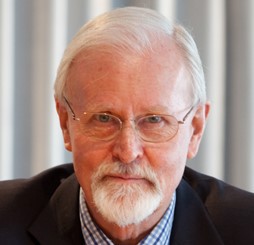
Dr. Per Pinstrup-Andersen
DENMARK
Dr. Per Pinstrup-Andersen, the catalyst behind the groundbreaking 2020 Vision Initiative, received the World Food Prize in 2001 for his contribution to agricultural research, food policy, and uplifting the status of the poor and starving citizens of the world. An agricultural economist by training, Dr. Pinstrup-Andersen’s major accomplishment has not been technical or scientific in nature; instead, it has been the recognition that true food security will come as much from reliable policy research and exchange and thorough policy implementation as it will from technological and scientific advances.
Full Biography
Born in Denmark in 1939, Dr. Pinstrup-Andersen was raised on a farm there and worked for several years as a farm laborer before pursuing his education in agricultural economics – first at the Danish Agricultural University, and later at Oklahoma State University, where he received his Ph.D. in 1969. His career began at Centero Internacional de Agricultura Tropical in Cali, Colombia, where he researched economics and public policy relating to agriculture and technology. He continued researching these and other related areas at the International Fertilizer Development Center in Alabama, and later at the Royal Veterinary and Agricultural University in Copenhagen, until 1980.
From 1980 to 1987, Dr. Pinstrup-Andersen was the Director of the Food Consumption and Nutrition Policy Research Program at IFPRI. He left that position to go to Cornell University, where he was a professor of food economics and director of the Cornell Food and Nutrition Policy Project until 1992.
From 1992 to 2002, Dr. Pinstrup-Andersen was the director-general of the International Food Policy Research Institute in Washington, D.C. Under his leadership, IFPRI became the world’s leading think-tank on hunger issues, taking on numerous groundbreaking research projects, including breeding staple crops for higher nutrition, improving the effectiveness of food-for-education efforts, and computer modeling through the IMPACT system to determine the effects of government policies on child malnutrition and food security.
In 1993, Dr. Pinstrup-Andersen launched the 2020 Vision Initiative, the most comprehensive and ambitious research and dissemination program ever undertaken on global food security. Commenced at a time when leaders worldwide were confident in biotechnological advances to ensure sufficient food supplies for the world’s growing population, 2020 Vision alerted the world to potential food security crises in the 21st century. By systematically gathering and disseminating information on major issues related to the production and provision of quality food, the 2020 Vision Initiative has engaged policymakers and researchers from around the globe in an ongoing dialogue and exchange. It has changed the priorities of governments, reversed the decline in donor support to agricultural research and development, and led to projects which have improved the lives of the world’s poorest citizens and reduced global poverty figures.
Research and policy discussions in Pakistan and Egypt increased the effectiveness of food rationing and subsidy programs in those countries, and the initiative also advised aid distribution efforts in Malawi and Uganda. Since 1994, IFPRI has worked with Bangladesh’s government in establishing and assessing the groundbreaking Food-for-Schooling program, by which parents receive food subsidies for keeping their children in school. IFPRI and 2020 Vision proposals to the World Food Programme allowed for more effective relief administration during the 1998 drought and ensuing famine which left more than 16 million people without food. Moreover, Dr. Pinstrup-Andersen and the 2020 Vision Initiative, by jumpstarting a new international round of food policy talks, contributed to the organization of the 1996 World Food Summit, where decisions were reached that have reduced the hunger and suffering of over 8 million people.
A vocal advocate for increased research to support food production and the policy surrounding it, Dr. Pinstrup-Andersen is the H.E. Babcock Professor of Food, Nutrition and Public Policy and Professor of Applied Economics at Cornell University. He also holds professorial appointments at the Royal Veterinary and Agricultural University (KVL) in Copenhagen and at Wageningen University in the Netherlands. He is president of the American Agricultural Economics Association and is the management chairman of the Science Council of the Consultative Group on International Agricultural Research, which under his leadership recently concluded a review of priorities for international agricultural research in the next ten years. In 2006, his research on armed conflict contributing to international terrorism and deterring development and food security was presented at the Charles Valentine Riley Memorial Lecture Series; his current research activities deal with the impact of globalization on poverty, food security and nutrition.
Dr. Pinstrup-Andersen holds several honorary doctorates and professorships from universities around the world, and has received the Charles A. Black Award, the 2002 American Agricultural Economics Association Distinguished Policy Contribution Award, and the Danish Agronomy Prize. He has written over 300 books, articles, and papers and his 2001 book Seeds of Contention has been published in five languages. Norman Borlaug, 1970 Nobel Peace Prize Laureate has noted Dr. Pinstrup-Andersen to be “one of the most influential economists and policy makers today” and “an outstanding spokesperson for effective economic policies for transforming agricultural production of food deficit nations". He continues his own research as well as fostering, contributing to, and coordinating the work of his peers.
Additional Links
Pinstrup Anderson: "What the World Food Prize Means to Me"
Pinstrup-Anderson: 25th Anniversary Laureate Essay
Pinstrup-Anderson Moderates 2006 Borlaug Dialogue Session Four
Pinstrup-Anderson Presentation: "Food Security Issues to 2050"


